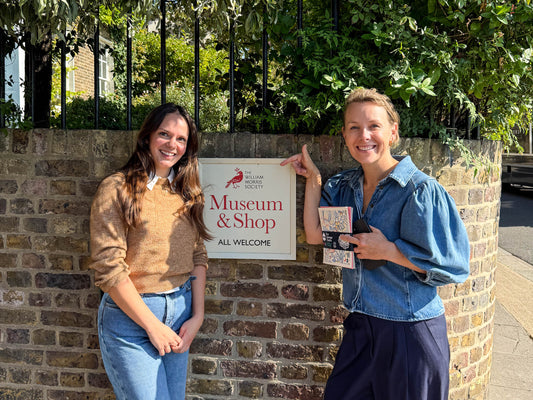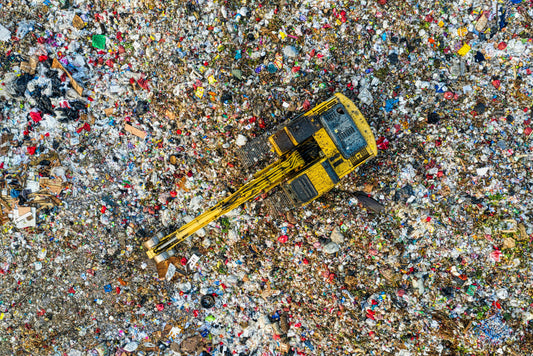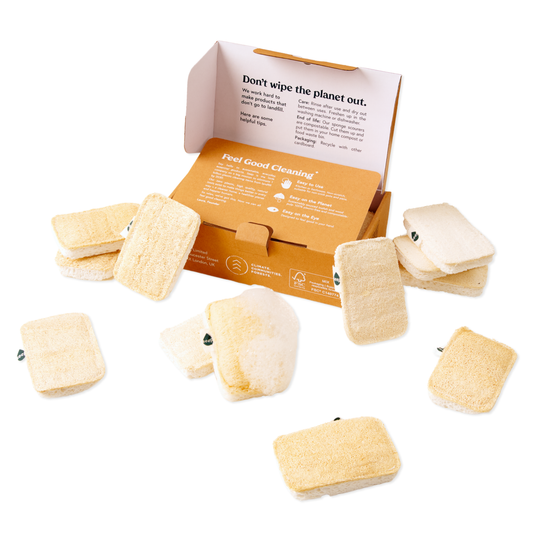
Our Founder Laura Harnett, spoke with Adam Harriott, Resource Management Specialist at WRAP, about the state of plastic recycling in the UK. Adam is a technical lead on a number of projects within the world-leading UK Plastics Pact.
Hey Adam, it would be great for you to give us a little intro:
So I'm Adam Harriott, a senior specialist at WRAP.
I work in the technical team, so I work on the UK Plastics Pact and work with other businesses, waste management recyclers and local authorities looking at the recyclability of plastic packaging as a whole. I also used to work in waste management myself before, so I've got a good understanding of exactly what happens to your waste.
Ok, tell us a bit about WRAP?
We are a Climate Action NGO who work across the globe but predominantly in the UK. WRAP work with waste management recyclers, brands, retailers, manufacturers - basically the whole supply chain across a range of different materials.
We are trusted advisors to the government and do a lot of work with DEFRA, such as impact assessments for their potential policies and consultations, what they mean and how they are going to work. This includes impacts on things like collections, recycling rates and the costs that might be associated with it through different parts of the supply chain.
Also, we also help provide grants and funding to different parts of the supply chain, so either local authorities or waste management recyclers to help build new facilities. It could even be to look at behaviour change interventions and making sure citizens know exactly how to recycle and what the best way of doing it is.
Amazing, so what is the UK Plastics Pact?
The UK Plastics Pact is looking at eliminating all problematic and unnecessary plastic packaging. WRAP want to make all plastic packaging 100% reusable, recyclable, compostable and make sure we're collecting and recycling at least 70% of the packaging placed on the market.
Ok, so how much of plastic packaging is actually recycled at the moment?
We've got quite a good, robust, mature recycling system, but in some more developing areas of the world, they don't have that formal waste management structure. So there's a lot of leakage into the environment and they don’t necessarily capture the material because of how they're using packaging and things like that. So think of India, for example, a lot of their packaging is single use sachets because that's how they consume their products because of the price of things and and how much money they earn with living wage etc.
So in the UK our stats show that we capture 70% of plastic packaging and of that we recycle 50%.
And are there targets in place to improve those numbers?
So by 2025 all plastic packaging needs to be 100% recyclable, and then the recycling rate should increase to 70%.
In the UK we have a plastics packaging tax that came in last April, which is basically £200 a tonne on any plastic packaging item that has less than 30% recycle content.
Our target is an average of 30% recyclability across the board. So we know for example things like milk bottles have a very high recyclable content but films, especially food films and flexibles are very low so it's impossible to get that recyclable content in. That's why we use an average across everything because we know that some are going to have a lot more big challenges than others.
Overall the world plastic production is still going up, is this the same in the UK?
In an ideal world we'll cut down the amount of plastic we’re using but it's a very difficult thing to do when we've got a growing population and we'd like to consume lots and lots of stuff. I think as a society it's probably fair to say we consume more than our fair share.
As a result of this the volume of plastic we're using as a country is creeping up slowly, but not significantly. Obviously it's a weird one in the last few years because we've had to contend with things like COVID, which kind of throws everything out of whack. For example, say you buy loose fruit and veg, during the height of the pandemic this just didn't happen because people worried about contamination. So our plastic consumption of films and vessels went up. Whereas generally our plastic consumption of all the other types of plastic went down. So it is a bit of a weird one trying to look at recent trends. It's not necessarily a black and white one.
Who’s the best in the world at recycling and waste then?
Off the top of my head I don't know, but best in the UK is Wales. They’re seriously good!
In Wales they have what's called ‘the blueprint’, where everyone collects in the same way. They've got little segregated containers so metal, glass and plastic which gets collected and taken away along with food waste as well - everyone just does it effectively. It was a long road, but they have been very, very successful at it.
Wow, that's amazing. Why is that, why are Wales so good?
Obviously they've got a very different demographic, very different sort of makeup in terms of rurality and urbanisation. So in UK, for example, London and Manchester, some of the big cities it’s very, very difficult because there's a lot of high rise buildings and flats. How to recycle in flats is notoriously, in the waste industry, a nightmare because everything goes in big bulk bins and there's a lack of ownership over your waste.
Whereas I'm lucky enough to live in a house, I've got kerbside collection, I know what goes in my bin. Obviously in the industry that I work in I'm quite diligent but when it comes to a block of flats, it only takes a couple of people to not be so diligent to chuck anything in a recycling bin for it then to be contaminated and as a result, rejected.
Wales have also invested a lot of money into infrastructure into how things work. They've had a very good strong strategy for the last decade or two.
So it seems like the key thing holding us back is the different council rules, what as citizens can we do to help move things forward?
There's no consistency and there're obviously infrastructure changes needed, there're new facilities that are needed and upgrades. So we know what we're collecting, how we're going to collect it, all that sort of stuff. So we're still awaiting on exactly what government is saying is going to happen unfortunately. There was a consultation a couple of years ago, which we're still unfortunately waiting for the results for.
So my top tips for now would be to keep recycling. Make sure you're rinsing it out, check what you can and can't recycle and most importantly don't wish-cycle!
Great, any more hot tips?
Buy loose fruit and veg, it doesn't need to be packaged and the only way to stop large supermarkets from doing it is to stop buying it. Then, store them properly. Did you know an apple in your fruit bowl lasts 21 days, but if you keep it in the fridge it lasts 100 days?
So last one, can you help us understand the recycling symbols better?
The symbol you should go by is symbol with the green heart arrow and it will say clearly do recycle or don’t recycle. What can be accepted and collected has to be collected by over 75% local authorities kerbside and have a recyclability of over 30%. You can learn more about the symbols here.
As a note, ignore the three arrows with codes such as PET or PVC etc, these are just telling you what plastic the item is and is totally useless to you!
Visit RecycleNow to find out more about recycling in your area.






